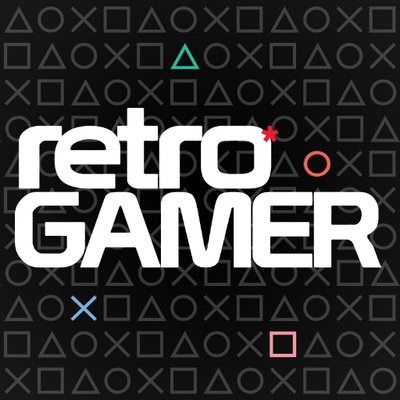Legendary Mario voice actor Charles Martinet on his favorite characters and why he now 'dreams in 2D'
A Retro Gamer Q&A with iconic voice actor Charles Martinet, voice of Mario in over 150 games
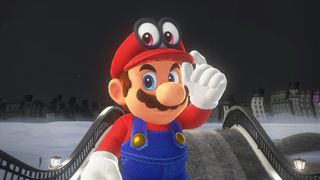
Super Mario voice actor Charles Martinet has voiced the iconic plumber in over 150 Super Mario Bros. games. But before he stepped into the Italian's overalls, he was already a successful voiceover actor.
Retro Gamer sat down with for a Charles Martinet interview that takes us through his entire career, from his beginnings as a voiceover actor, his start with Nintendo, and the most difficult voices he has to pull off. Martinet went from trying out a career in acting to swapping over to voiceover work, which led him right to Nintendo. As the voice of Mario, he's been in over 150 games, from the first Super Mario Bros. game to Super Mario Bros. 64 to this year's Super Mario Superstars.
Martinet spoke to Retro Gamer from Italy (how fitting) and broke down his entire career, his favorite voices, and explains how he dreams in 2D.
Super Mario Charles Martinet interview
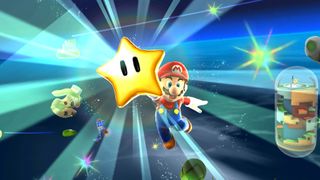
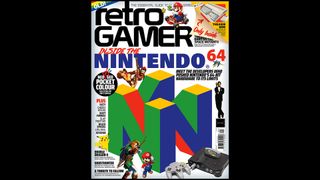
For more in-depth features exploring classic games and consoles delivered right to your door or device, subscribe to Retro Gamer today in print or digital.
Retro Gamer: How did you get into acting and voiceover work?
Charles Martinet: I was studying political science at UC Berkeley, and I had the greatest professor. I went back for my final year, and I couldn't get into his class. I said, 'Fine, I will do what anyone would do, I QUIT. I'll go away and come back when I can take this class.' And a friend of mine said, 'Why don't you come and take an acting class from me?' And I said, 'There is absolutely no way, I'm way too shy.' And he says, 'Oh come on, you'll have fun, you don't have to do anything if you don't want to. Just go in, we'll go and have lunch at the student cafeteria where they are learning to become Michelin starred chefs.' And I said, 'Lunch?' That was it, the lunch got me.
I enjoyed watching and listening to everyone, and then they said, 'Go ahead and learn a monologue.' I was shaking like a leaf, but somehow I reached the end of it, and everyone politely clapped, as you do in acting class, and [my friend] Lester said, 'I want to know how it is you're the only person of all of us that wasn't nervous at all.' Whaaaat! The reason I actually became an actor was failure. I started getting my confidence up, and they were auditioning for A Midsummer Night's Dream. I was convinced that Oberon was the part for me.
So, I studied and studied, I did everything to get this part. I knew I really did a spot-on audition, and I called Lester. He says, 'Charles, don't count your chickens before they hatch, this is college, and you never know what's going to happen.' I got nothing. I not only didn't get Oberon, I got nothing. And that failure is why I'm an actor. So that is what set the fire in me to become an actor, and then it's been 40 fantastic, fun, wonderful years, of joy and happiness, performing and learning the art, the craft of acting.
Sign up to the GamesRadar+ Newsletter
Weekly digests, tales from the communities you love, and more
Where did you study?
I went to the Drama Studio of London, England – Sir John Gielgud was the patron, Peter Layton the creator and headmaster, really fantastic, and that was 1979- 1980. I came back to the United States, did theatre for ten years, and then I felt I needed a break from theatre. The phone rang, there was a guy saying, 'Do you want to audition for a corporate video?' So, I went and auditioned for that, and found I was making more money doing a day of that than I made in a week of the theatre. So, I thought, 'I'm a corporate video actor!' And along came radio. I was doing a TV ad, and the producer at the end of the day said, 'Do you do voiceover?' I read it; it was ten seconds. I can't really remember, something like, 'Orchard Supply, the right item at the right price, right now.' And here's another 250 dollars, which is how much I had made for standing there for nine hours [on the TV ad], and I said, 'I'm a voice actor! {Mario} Yippee!'
Q: How did you then become Mario?
I just happened to be living the actor's life, sitting on the beach, waiting for my pager to go off 30 years ago, and it's a friend of mine. He says, 'Hey, you gotta go audition for this trade show you know, because I'm doing part of the show and you can be in it.' 'Wait a minute, you mean crash an audition? There's no way I would ever crash an audition, I am a professional actor... Where should I go?' I left that beach, I went to this audition.
As I was walking in the door, the producer was walking out and the cameraman behind him with the case. And I said, 'Hi, can I read for this part?' And he signs and goes, 'OK. Alright, we'll set the camera back up, come on in. You're an Italian plumber from Brooklyn named Mario, for this company Nintendo, it's a video game character. We're going to create a real-time animation system so you will talk as this character, and the audience will see the character. But you'll have a hidden camera, hidden microphone. We're gonna call it MIRT, like Mario In Real Time. So, make up a voice, make up a video game, make up anything you want, I don't care, just carry on until you run out of things to say.'
I'm literally thinking, 'OK, video game {Pac-man} Wakka wakka wakka. How do you make up a video game? Italian plumber from Brooklyn? {Rough voice} Hey, get outta my face, I'm working 'ere. I don't want to do that, because if I did that for nine hours a day, it would be horribly unhappy and negative and what if there are children?' So, I had done Gremio in Taming Of The Shrew a few years before. 'I know, I'll do Gremio. {Italian accent} A nice Italian guy, you know? Like this, I'll make it younger, I'll just make up things about food.'
"I can’t imagine a more fulfilling career than the one I am having"
And I heard 'ACTION!' I said {Mario} 'Hello, I'm-a-Mario, let's make a pizza pie together. You get some sausage, I will get some spaghetti. And then I chase you with the pizza, and if I catch you with the pizza, you gotta eat de pizza.' He didn't say cut, so I said {Mario} 'And then, we're gonna make lasagne, and I'm gonna chase you around and then you're gonna chase me.' And he never said stop, so I kept going through every pasta I have ever heard of, and then I started making pasta up [until] I finally heard, 'Stop talking, cut, there's no more video tape. Stop, thank you, we'll be in touch.' And I was for sure that was the end, I would never hear another word.
I went back to the beach, watched the sunset, went to dinner with my friend. He got on the phone, he called Nintendo, 'I've found our Mario, we've got him.' And that was 30 years ago, we went and did the show, it was supposed to be a one-off. We had so much fun, that it ended up being two and then four and over and over again. When the Nintendo 64 was about to come out, I was doing Mario In Real Time and making the press announcements. And we were doing all kinds of events with Mario and one day the phone rang. 'Mr Miyamoto would like you to play Mario in a game.' I think I said, 'Woohoo!' And that was Mario 64 in 1996, which is 25 years ago, which is just incredible.
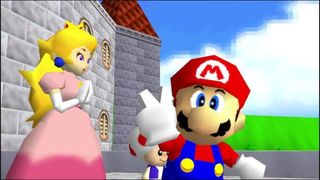
How do you prepare for a recording session?
That's a great question. These characters for me are always there. I mean, I dream as Mario, flying over these lakes or over the ocean, in the moonlight, a little bit Galaxy-esque. And I sometimes dream in 2D. If I wake up in the morning and I'm having a lousy day, I'm like {Wario growl}. These voices are just alive in me, along with {sings the Super Mario Bros start jingle} {Mario} Go! So, there's not a lot of preparation [for Nintendo]. Now, I was doing this wonderful documentary for Netflix called High Score. For that, it's just trying to get that first launch place, understand where you're going for the transitions, and then get to the end. Try to be natural, try, try, try, try... and then when you get to the session, throw it all out the window and just be in that moment. You just have to think it or feel it and that's enough.
"I dream as Mario, flying over these lakes or over the ocean, in the moonlight, a little bit Galaxy-esque. And I sometimes dream in 2D"
Whereas in video games and cartoons, it's gotta be bigger. It always has to be truthful, yourself as that character and forgetting all the lessons, all the observations and the rhythms and the paces, just being in that moment. {Drawl} So when you're playing that character and being it, {normal} and once you let go, at the beginning you might be thinking he's got beady eyes and a big jaw {Wario} or a big jaw and big eyes {normal} you make a decision and then, it's time to be in the sandbox with my shovel and my pail and I'm just going to make my little castle. Of course, as an actor I'm always drinking water, hydrating, making sure my vocal cords are well hydrated and able to do the ranges that I wanted.
Did you enjoy narrating High Score?
That was really fun. I also learned a lot about games. I met Nolan Bushnell, he's a brilliant guy. And I met some of the people in there, and I didn't know the way it all hinged together, I learned so much doing that, and I just wanted to do more. I'm ready for the next documentary series.
When you get a video game script to record, is it different from your other forms of voiceover work?
We actually have scripts you know! With something like Paarthurnax {dragon} 'What brings you to The Throat Of The World?' You actually have to learn dragon speech; the writers created a language for dragons speaking. So, you do study your script as much as you can. And then for me, I make a living improvising. I start thinking of my improv as soon as I do the one version that's exactly as written, and I'm immediately thinking what else I can do. I will mark all over the script, what it is that I want to try that's different, so I don't forget.
And then once I start improvising, I then just take it off the page and start playing and be playful. I wanted Nintendo to have millions of sound files, I think by now they've got them! I'm the sort of actor, we're going to do three versions, one exactly like this, and that'll be our take. I'll start with those three and then do another nineteen more till the director goes, 'OK, stop, we've got it.' 'Can I try one more thing?' Oy!
Which dialogue took you the most takes?
Mario Strikers took some takes because it was so much more {vocals} Yahh! Whurr! And I also remember Super Mario 3D World, with the cats – {Cat Mario} Meow. At first, I thought it was going to be like {small meows} a little more {louder MEOW}, {MEEEOOWW}, that’s the one. It's always that exploration, that's the fun. So much fun.
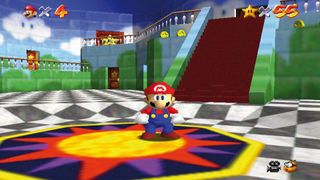
So, on a typical recording day, how long will you be in the studio?
It all so much depends... because I've recorded two weeks... actually, one week before a game came out, and I've recorded three years before a game came out. And I've recorded an hour, and I've recorded 20 hours. So, it really depends on the game, and what's coming next. I love Super Mario Odyssey, that was so fun. {Ribbit} The characters change and switch, you know.
From the moment I saw Cappy I knew this game is going to be magical. I couldn't understand at first, what you mean you throw it and become that? And then you see the dinosaur and you're like, 'Oh, I have it, this is going to be fun.' [Laughs] It's never a challenge, you know. That's why, to me, when you get to the studio, you're in play mode – because you are in love with the character. Whatever it is, whether it's the eagle, dragon... You know, the evil character never thinks he's evil. He only sees life from his eyes, and so you just play that moment and just let it come out.
One day I went into a studio and there was this gorgeous character Wario. {Wario} Have a rotten day! [blows raspberries]. There it is, we want you to do that voice. One day I went in, and it was Luigi. One day it was Luigi and Mario talking, {Luigi} Do do dot do do do do dayo {Mario} Oh gee, wat a doot do dot Italia. And then one day, for [Mario] Tennis, and I was like {Waluigi} Waaaaaah, it was Waluigi. It's just been one wonderful gift after another, and of course {Baby voices} Baby Luigi and Baby Mario, let's go! One beautiful gift after another of playfulness, and joy.
Do you get to see much footage of the characters, or images, before you voice them?
Great question! Sometimes I see tremendous amounts, and other times I see nothing. The wonderful thing is, all these years of working with the people at Nintendo, we have so much trust in each other it doesn't matter where the idea comes from. It's all exploration and playing, and the texture comes out. What if I try this? We pass on all that we gather to the producers and directors, and then we get feedback, and we do more like that, more like this and then it's a fun dance of discovery. And I never know exactly where it's going.
I'm a big believer in making your decisions early, and then you're playing, you're dancing in the studio. You just make sure that you always maintain the thread. Every character goes through a transition arc, there's fundamentals, there's core belief, and so I make those decisions early on so that once I'm in the studio I'm living by that standard and play in that ballpark. The emphasis is on the play, by the way.
What would you say is your most memorable recording session?
I love every one for so many different reasons. But since I've been doing Mario... there were two that were really amazing. Mario Teaches Typing was one amazing thing. It was a lot of dialogue. On the show floor I was playful, joyful, a little bit this, a little edge in there, everything was playing around and having fun... but in Mario Teaches Typing, when I was dealing with children learning something, I read the script and I saw negatives – like, 'Oh that wasn't very good, try again,' or 'that was a failure'.
Then I said, 'What if my character never says no, or is never negative, never 'that was a failure' – what if instead it's like 'great try', 'let's do it again, I know you can do better' {Mario} 'Oh, that was great, now let's do it again' or 'Not as good this time, but you're gonna do it better this time, let's go!' Creating that dynamic of positive energy and positive influence, to me the character is always love, always respect, always a joy. Even in the fear, the terror, the adventure, all of that, it always still had to have that vibrancy, that alive spirit of pure joy and pure love.
So that taught me something, when, 'Mr Miyamoto would like you to play Mario in a game,' and Mario 64 came along, I had five years plus of the great invention and what I was going to do in my mind to put into the game. We were like a little intrepid expedition here, {Mario} whoa whoa whoa. Now what happens if you fall on the thing, something like it's, ah, {Mario falling} Waaaaaaah! That was such a playful, fun exploration. But then each one. Galaxy. {Mario} Yay! Just the joy, the thrill of that flying, and the fun. And then Odyssey. Oddly enough, it was like a tribute to the past and the future, it was wonderful. And like, Sunshine. Those are my favourite games, times five or so, Super Mario 64 for that first experience of being in there, and Galaxy. Mario Kart was another one. Sunshine, where we were gaining our footing on how to keep that character really going in that exploration and joy. So those two games started it, and Odyssey is such a continuation. The new, the magical, the fun.
Are things very different now from when you started?
It's been quite a progression, from the tiniest amount to as much as they want. It's a great piece of Nintendo, that Mario's been around for so many years because the elements are always new and always reliably the same. You know, all new and all the same, the music is always fun, the character traits are always there, the love, joy, the happiness, the fun, {Mario} Wheehee! Owowowow! Those things are there but then also the new power-up, the new adventure, the Cappy in the world, the Cat, the things that always surprise the gamer. And I think that's the key, the gamer is number one and the rest of us are just trying to have fun making that fun.
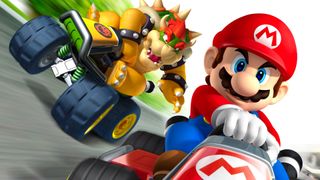
What are your favourite characters?
Oh, yes. Mario, Luigi, Wario, Waluigi, Baby Mario and Baby Luigi. [Laughs] In the known universe.
Is there a character you would like to voice?
You know, I am so happy. I have been given so many beautiful gifts. Of course, I want to play ALL the parts, all the time. But you know, I can't imagine a more fulfilling, joyful, fun time and fun career than the one I am having.
You’ve been to many conventions and trade shows, what have been your favourites and what made them special?
Oh gosh, I loved the launch in London of Odyssey. That was such a joy, such a pleasure, so many people playing that game. I was also in London for the launch of Mario Maker, and being in a room with a bunch of pros, as they competed against each other, that was incredible.
They made levels that were so hard, you had three chances to get by the first obstacle. OK, somebody made it past that first one and then by osmosis, the next person knew how to get past that one, but not to get past the next one. And then it just kept going. And then the guy that created that level did it, and it was like {cheers} Yaaaah! My version of a level is like, I make it so you can't possibly die. So, there's no holes, you go {spring} Boing, boing {Mario} beedeebeedeebee, I put coins in every single slot and then everybody wins, it's just like life (laughs).
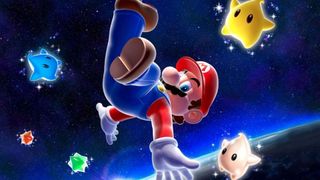
Are there any organisations you’ve been able to help through your work?
I love all the charities that Nintendo supports, like the Make-A-Wish Foundation, just wonderful people. I'm always happy to contribute to anything that brings fairness and equality to the world.
Brilliant to talk to you Charles.
{Mario} Thank you so much, see you next time!
This interview with Charles Martinet was originally published in Retro Gamer magazine, issue 222.
Retro Gamer is the world's biggest - and longest-running - magazine dedicated to classic games, from ZX Spectrum, to NES and PlayStation. Relaunched in 2005, Retro Gamer has become respected within the industry as the authoritative word on classic gaming, thanks to its passionate and knowledgeable writers, with in-depth interviews of numerous acclaimed veterans, including Shigeru Miyamoto, Yu Suzuki, Peter Molyneux and Trip Hawkins.

My favorite Spelunky character is a masterclass in roguelike risk versus reward: "Stealing in games is fun in the same way running across the top of the screen is in Super Mario"

"Even Baldur's Gate 3 became so good because of Early Access," which is why the Dead Cells devs are using the same trick for their roguelike Prince of Persia
Most Popular





